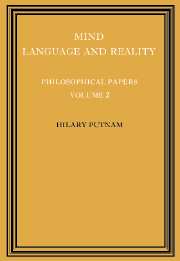Book contents
- Frontmatter
- Contents
- Dedication
- Introduction
- 1 Language and philosophy
- 2 The analytic and the synthetic
- 3 Do true assertions correspond to reality?
- 4 Some issues in the theory of grammar
- 5 The ‘innateness hypothesis’ and explanatory models in linguistics
- 6 How not to talk about meaning
- 7 Review ofThe concept of a person
- 8 Is semantics possible?
- 9 The refutation of conventionalism
- 10 Reply to Gerald Massey
- 11 Explanation and reference
- 12 The meaning of ‘meaning’
- 13 Language and reality
- 14 Philosophy and our mental life
- 15 Dreaming and ‘depth grammar’
- 16 Brains and behavior
- 17 Other minds
- 18 Minds and machines
- 19 Robots: machines or artificially created life?
- 20 The mental life of some machines
- 21 The nature of mental states
- 22 Logical positivism and the philosophy of mind
- Bibliography
- Index
18 - Minds and machines
Published online by Cambridge University Press: 12 January 2010
- Frontmatter
- Contents
- Dedication
- Introduction
- 1 Language and philosophy
- 2 The analytic and the synthetic
- 3 Do true assertions correspond to reality?
- 4 Some issues in the theory of grammar
- 5 The ‘innateness hypothesis’ and explanatory models in linguistics
- 6 How not to talk about meaning
- 7 Review ofThe concept of a person
- 8 Is semantics possible?
- 9 The refutation of conventionalism
- 10 Reply to Gerald Massey
- 11 Explanation and reference
- 12 The meaning of ‘meaning’
- 13 Language and reality
- 14 Philosophy and our mental life
- 15 Dreaming and ‘depth grammar’
- 16 Brains and behavior
- 17 Other minds
- 18 Minds and machines
- 19 Robots: machines or artificially created life?
- 20 The mental life of some machines
- 21 The nature of mental states
- 22 Logical positivism and the philosophy of mind
- Bibliography
- Index
Summary
The various issues and puzzles that make up the traditional mind–body problem are wholly linguistic and logical in character: whatever few empirical ‘facts’ there may be in this area support one view as much as another. I do not hope to establish this contention in this paper, but I hope to do something toward rendering it more plausible. Specifically, I shall try to show that all of the issues arise in connection with any computing system capable of answering questions about its own structure, and have thus nothing to do with the unique nature (if it is unique) of human subjective experience.
To illustrate the sort of thing that is meant: one kind of puzzle that is sometimes discussed in connection with the ‘mind–body problem’ is the puzzle of privacy. The question ‘How do I know I have a pain?’ is a deviant† (‘logically odd’) question. The question ‘How do I know Smith has a pain?’ is not all at deviant. The difference can also be mirrored in impersonal questions: ‘How does anyone ever know he himself has a pain?’ is deviant; ‘How does anyone ever know that someone else is in pain?’ is non-deviant. I shall show that the difference in status between the last two questions is mirrored in the case of machines: if T is a Turing machine (see below), the question ‘How does T ascertain that it is in state A?’
- Type
- Chapter
- Information
- Philosophical Papers , pp. 362 - 385Publisher: Cambridge University PressPrint publication year: 1975
- 37
- Cited by



